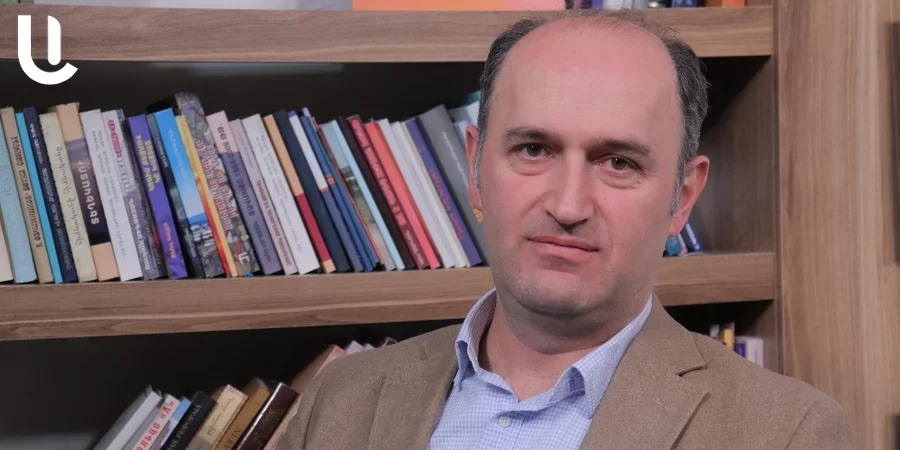“Artsakh experienced a management crisis as a result of a weakened immune system. Many people believe that Artsakh was surrendered in a single day, but in reality, there was a very serious struggle, and people eventually realized that they had no opportunities, and they were exhausted… there was a heroic struggle, and this nation is truly heroic. Regardless of how many people turn the pages or do something else now, we must clearly look the people of Artsakh in the face and admit that they are heroes,” said Hayk Shekyan, Founding Director of Shtigen Group, in an interview with Aravot.am, referring to the Artsakh people’s stamina during the blockade.
Shtigen Group implemented two important projects in Artsakh: Bright Border and Sunrise in Artsakh. Sunrise in Artsakh was launched during the blockade, but Hayk Shekyan does not discuss the project with a focus on the past, since the company is still forging relationships with Artsakh inhabitants. The current geopolitical conditions indicate that Armenia must also prepare for potential crises, most notably the energy crisis. We asked if our interviewee, as someone who has worked in this field for many years, had any ideas about how it should be organized, what anti-crisis steps and programs the government should take or if they have already been taken, and what behavior the business community should exhibit.
According to Hayk Shekyan, there are risks for business today in the context of long-term geopolitical shifts, such as the dynamics of energy prices.
“Very soon, within one or two months, gas and petrol prices may rise, which directly affects the cost of our products, thus also the competitiveness, export potential, and so on,” Shekyan said, adding that in this sense, the business community should try to achieve greater certainty for itself both personally and through various business associations, as well as in its relations with the state.
He observes competent work at the first level. Change in export markets – from the EAEU to the Middle East, shift in raw material markets, import of new technology, and so on.
However, Shekyan emphasizes the existence of another trend: entrepreneurs are canning the business because of the risks, which, he says, is the worst thing if it comes en masse. And it is here that the state and business groups should play a regulatory role, introducing swift anti-crisis measures so that the process does not suddenly become a chain reaction, because what happens in one area can spread to another. A similar situation occurred in the early 1990s, when an economy with a significant industrial complex collapsed.
“Now we must not allow this to happen,” Shekyan concluded.
We were also curious what our guest thought of Artsakh’s surrender and the forced displacement of Armenians.
“Many people have not closed the book on Armenian Artsakh for themselves; is Artsakh irretrievably lost, or can political situations open new doors?”
“To put it plainly, you cannot close the book on what constitutes a homeland. There will be various analyses of what happened, but at this point in time, I believe action and activity around some axis is critical.
A lot of things need to be rethought, and this rethinking should be centered on action if at all possible,” Shekyan responded, adding that we are accustomed to putting issues on hold, talking, discussing for long periods of time, years and months, saying that we need to become stronger, unite, but in practice we do very little of that. “We must make one become one thousand, from the most primitive level to the state axis.”
“Not only is the land valuable to me, but so is the human being, perhaps the human being first and foremost. In some ways, land is useless without a human being. Under this regard, for me personally, and this is my attitude, it is more vital to preserve Artsakh’s gene pool, and it is around half a million individuals who are carriers of this gene, not the more than 100 thousand people who had to leave, fleeing under awful conditions. First and foremost, it is a matter of keeping their identity… If we can begin and walk this path, we can reserve the right to dream and, in a sense, reclaim the land with its attributes,” Hayk Shekyan says.
“Perhaps one of our nation’s long-term problems is that we have failed to correctly position ourselves in various historical situations, to find ourselves smarter, savvy, and stronger.” After all, the geopolitical forces that surround and affect us nowadays are often guided by double standards or may pursue unprincipled actions based on their own interests.
“We must recognize our nation’s interests and have the understanding and ability to pursue both double and hybrid policies that, God willing, we will be able to bolster with force one day,” Shekyan concluded.
For more: https://bit.ly/49tgGbi
Aravot.am
